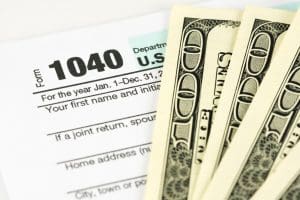The economic crisis caused by the coronavirus pandemic poses a triple challenge for tax policy in the United States. Lawmakers are tasked with crafting a policy response that will accelerate the economic recovery, reduce the mounting deficit, and protect the most vulnerable.
To assist lawmakers in navigating the challenge, and to help the American public understand the tax changes being proposed, the Tax Foundation’s Center for Federal Tax Policy modeled how 70 potential changes to the tax code would affect the U.S. economy, distribution of the tax burden, and federal revenue.
In tax policy there is an ever-present trade-off among how much revenue a tax will raise, who bears the burden of a tax, and what impact a tax will have on economic growth. Armed with the information in our new book, Options for Reforming America’s Tax Code 2.0, policymakers can debate the relative merits and trade-offs of each option to improve the tax code in a post-pandemic world.

Tax Treatment of Nuclear Energy Should Be Simplified, Neutral, with Renewable Energy Sources
Tackling climate change and shifting the economy towards renewable energy has been a key part of the Biden administration’s agenda. However, this effort must first confront an overly complicated and non-neutral tax code, particularly in how it treats nuclear energy, for the White House to reach its ambitious goals.
6 min read
Senator Warren’s Corporate Book Tax Is Wrong Way to Fund New Spending
The arguments for a new surtax on corporate book income misconstrues why there are differences between a corporation’s taxable income and book income.
5 min read
Will FDII Stay or Will it Go?
While the Biden administration has certainly proposed to remove FDII, it is not clear that Congress is on board with that approach.
5 min read
Striking Right Balance for Cryptocurrency Reporting Requirements in Bipartisan Infrastructure Package
While it makes sense to ensure cryptocurrency transactions are treated similarly to other financial assets, the nature of these requirements as written are potentially unworkable.
3 min read
Three Reasons Why Full Cost Recovery Is Right Even if Assets Increase in Value
The ideal treatment is to match the tax code to a firm’s cash flow—allow immediate deductions for all expenses, including all forms of investment, while taxing the resulting returns from the investments.
4 min read
Return-Free Filing: A Better Fit for a Better Tax Code
Return-free filing could reduce compliance costs for many taxpayers, but would only be as good as the system it is administrating.
4 min read
Should the U.S. Copy Denmark’s Social Welfare Policies?
To fully follow the Scandinavian model would require additional taxes that place a higher burden on middle-income earners, but instead, Biden proposes higher taxes on corporations and households making more than $400,000.
3 min read
Pennsylvania Considers the Equivalent of a $2 Per Gallon Gas Tax
A vehicle miles traveled (VMT) proposal gaining steam in Pennsylvania would be the equivalent of a state gas tax of more than $2 per gallon, and that’s not all the Commonwealth is considering.
7 min read

Comparing Three Financing Options for President Biden’s Spending Proposals
While Congress continues to debate how to pay for President Biden’s spending proposals in the fiscal year 2022 budget, it is useful to consider the economic impact of a range of financing options in addition to the President’s proposed tax increases.
3 min read